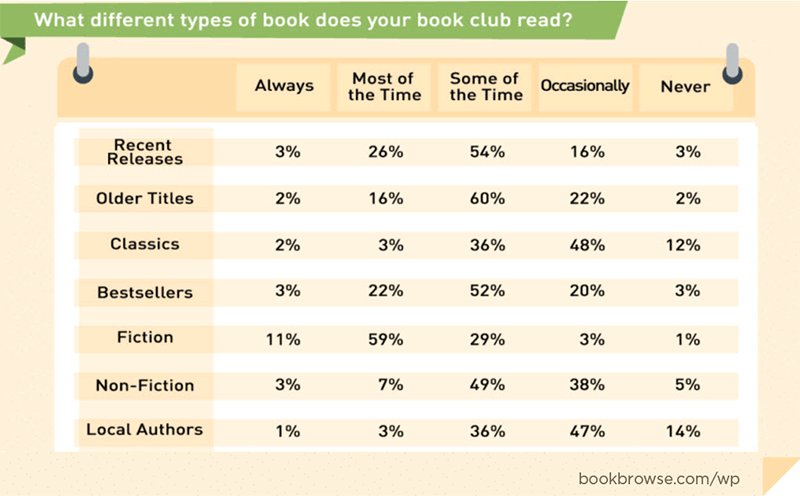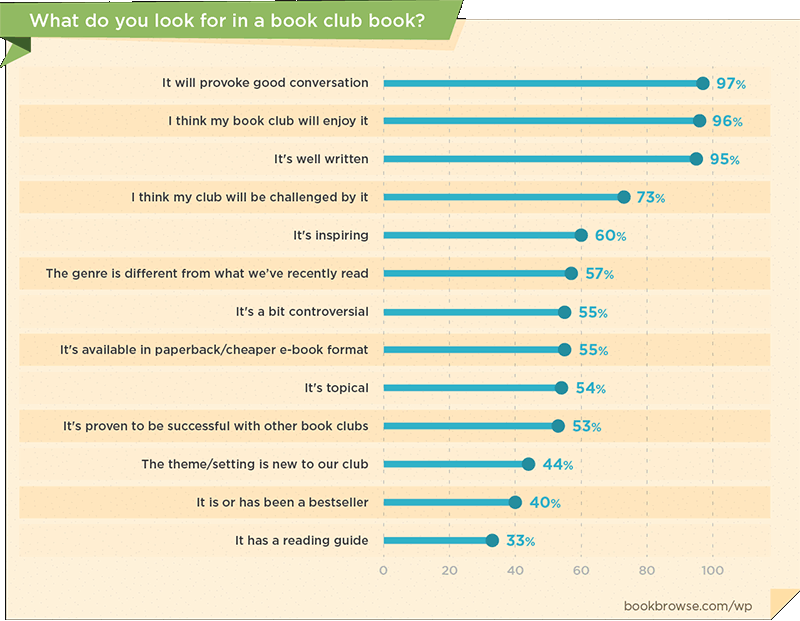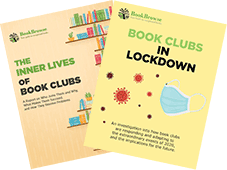When you look at the representation of book clubs in the media in general, they are often portrayed as social groups that drink wine and gossip and - if there's time - discuss rather unchallenging works of "women's fiction." This view is shared by many readers. In fact, when we asked people who read at least one book a month and who are not in a book club their reasons for not being in one, 33% said they thought book clubs are primarily social groups not engaged in serious book discussion!
While there is truth to the idea that many book clubs make time for social discussion and that some enjoy a glass of wine (more on these topics in future posts), data shows that book groups generally read high-quality, thought-provoking books that spur intellectual debate across a range of genres and topics.
 For our 2019 report, The Inner Lives of Book Clubs, BookBrowse conducted two surveys of a total of more than 5,000 book club participants. This report--in conjunction with our 15 years of research into book clubs and readers in general (during which time we've surveyed over 20,000 people)--has given us new, data-driven insights into how book clubs function and what they want from the books they read.
For our 2019 report, The Inner Lives of Book Clubs, BookBrowse conducted two surveys of a total of more than 5,000 book club participants. This report--in conjunction with our 15 years of research into book clubs and readers in general (during which time we've surveyed over 20,000 people)--has given us new, data-driven insights into how book clubs function and what they want from the books they read.  Overwhelmingly, book clubs want to read books that will provoke good conversation - a whopping 97% of book club members consider that a core criterion in the books they choose! 73% actively seek out books that challenge and 55% look for books that are controversial.
Overwhelmingly, book clubs want to read books that will provoke good conversation - a whopping 97% of book club members consider that a core criterion in the books they choose! 73% actively seek out books that challenge and 55% look for books that are controversial.
"I want to read and discuss books that challenge me both as a reader and philosophically."
"I want to think deeply about issues from different perspectives."
"You don't have to love the book to be able to discuss it."
This means that fun and easy reads, while enjoyable, might not foster the most positive book club experience and, conversely, reading books that challenge people and spark debate (even if not loved) can provide exceptional book group meetings that keep people enthusiastic and engaged.
Many book clubs also look for variety in the books they select - 57% say that they look for something different from what they've recently read - and as such, they read across a wide range of genres, for example 93% of book clubs read nonfiction at least occasionally, and 85% read classics.
Through many years interviewing individual book clubs, we have seen that the longer a group is together, the broader their reading tends to be. Clubs that start off reading safe bets start to explore new genres and themes as the group's tastes and confidence grow. Indeed, according to our 2019 report, 91% of respondents feel that "exposure to books I otherwise wouldn't read" is very important to their book club experience.
"I enjoy reading books I would not have normally chosen and challenging myself as a reader."
"I love the opportunity to discuss books I might not otherwise read with people I trust."
"It's a chance to discuss ideas, exposure to things I might not have sought out on my own."
Interestingly, this provides another example of how the perception of book clubs among many of those not in one is different to the reality of being in one: 36% of those we interviewed who are not interested in joining a book club said they did not want to join because they were afraid they wouldn't like other people's book choices!
Outside of a book's content, 33% of book club participants consider the availability of a reading guide to be important, 40% are drawn to best sellers, and 55% look for paperbacks (or a cheaper, e-book format).
For more information on what book clubs look for in their reading selections, check out our report The Inner Lives of Book Clubs.
So what does your book club look for in a book? Post a comment below, we would love to hear from you!
 The findings in this article are drawn from our published research: The Inner Lives of Book Clubs and/or Book Clubs in Lockdown. More about both at bookbrowse.com/wp.
The findings in this article are drawn from our published research: The Inner Lives of Book Clubs and/or Book Clubs in Lockdown. More about both at bookbrowse.com/wp.
You can see more articles in The Inner Lives of Book Clubs section of this blog; and receive future articles in your mailbox by subscribing to our newsletters, in particular Book Club News or Librarian News.
And if you're looking for an expert on book clubs for interview, please contact us!